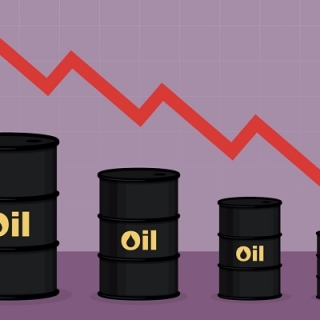


Oil prices plunged on Tuesday to their lowest in more than a week as U.S. President Donald Trump said a ceasefire had been agreed between Iran and Israel, easing concerns about supply disruptions in the region.
Brent crude futures fell $2.69, or 3.76%, to $68.79 a barrel by 0006 GMT, after falling more than 4% earlier in the session and hitting their lowest since June 11.
U.S. West Texas Intermediate crude fell $2.7, or 3.94%, to $65.46 a barrel, after hitting its weakest since June 9 earlier in the session and dropping about 6%.
Trump announced on Monday that Israel and Iran had fully agreed to a ceasefire, adding that Iran would begin the ceasefire immediately, followed by Israel after 12 hours. If both sides keep the peace, the war will officially end after 24 hours, ending 12 days of conflict.
He said a "complete and total" ceasefire would be in place with the aim of ending the conflict between the two countries.
"With the ceasefire news, we now see the continuation of the risk premium that was built into crude prices last week almost evaporate," said Tony Sycamore, analyst at IG.
Iran is OPEC's third-largest crude producer, and easing tensions would allow it to export more oil and prevent supply disruptions, a major factor in the surge in oil prices in recent days.
Both oil contracts closed more than 7% lower in the previous session after rallying to five-month highs after the US attacked Iran's nuclear facilities over the weekend, stoking fears of a wider Israel-Iran conflict.
"Technically, overnight's selloff reinforced a resistance layer between about $78.40 (October 2024 and June 2025 highs) and $80.77 (this year's high), and it's clear that it would take something very unexpected and supply-detrimental for crude to break through this resistance layer," Sycamore added. (alg)
Source: Reuters
Oil prices stabilized on Thursday (February 12th), as the market reassigned a risk premium to US-Iran tensions despite US inventory data showing swelling domestic supplies. This movement confirms one ...
Oil prices rose on Wednesday (February 11th), supported by a combination of geopolitical risk premiums from US-Iran tensions and more solid Asian demand signals particularly from India which helped ea...
Oil remained in the green zone on Tuesday (February 10th), as the market refused to abandon the Middle East risk premium. As of 13:07 GMT (20:07 WIB), Brent rose +0.4% to $69.32/barrel, while WTI rose...
Oil prices fell about 1% on Monday as concerns about conflict in the Middle East eased slightly. The market calmed after the US and Iran agreed to resume talks on Tehran's nuclear program, reducing fe...
Oil prices moved slightly higher in a volatile session on Friday, as investors assessed the direction of nuclear negotiations between the United States and Iran. Price movements appeared sensitive to ...
Oil prices stabilized on Thursday (February 12th), as the market reassigned a risk premium to US-Iran tensions despite US inventory data showing swelling domestic supplies. This movement confirms one thing: geopolitical headlines are still more...
Gold prices weakened slightly on Thursday (February 12th), as more solid US employment data reduced market confidence in an imminent Federal Reserve interest rate cut. The strong employment data prompted market participants to shift expectations of...
The Hang Seng Index reversed its downward trend in Hong Kong on Thursday (February 12th), weakening by around 0.9% to around 27,000 after a strong session earlier. This decline halted the momentum of the short term rally, as investors began to...